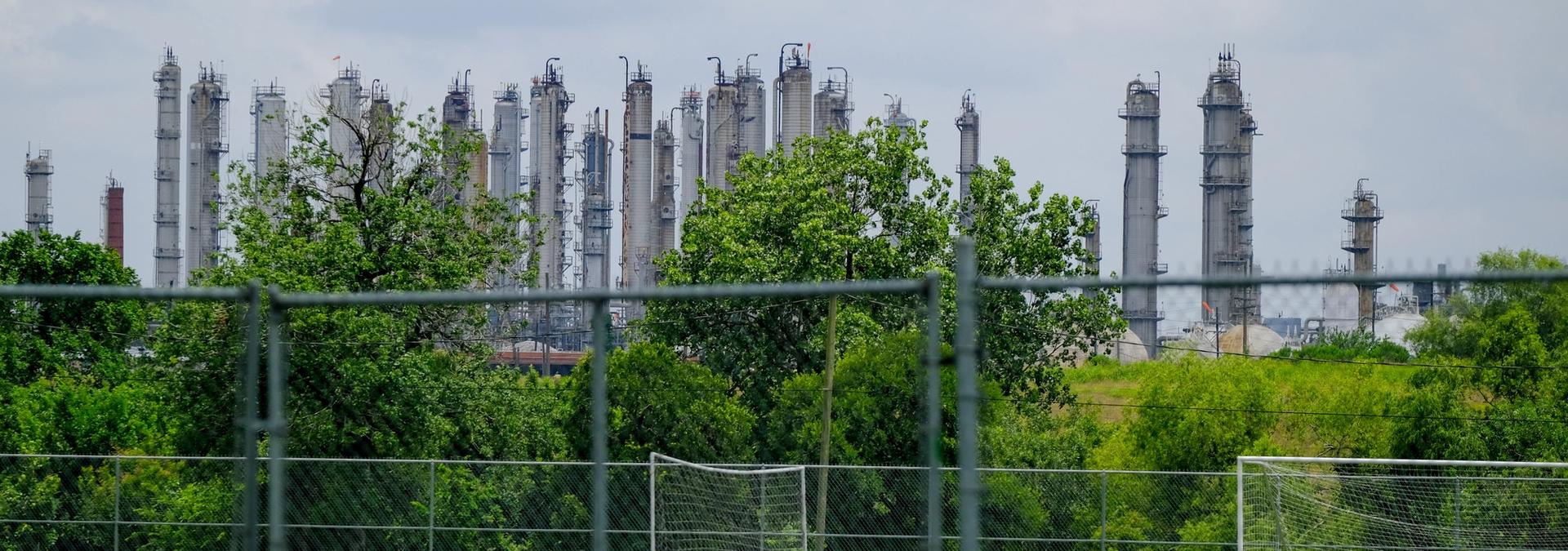
Butadiene causes cancer. A corporation with a history of illegal pollution wants to release more of it in Houston.
TPC Group's Houston plant was among the worst polluters of the cancer-causing 1,3-butadiene in Texas in 2019.
TPC Group, a corporation with a history of industrial fires and illegal chemical releases, owns two plants that are among the worst polluters of 1,3-butadiene in Texas. Now, this corporation wants to expand their operations in Houston.
Butadiene is a compound used to make plastics and rubbers, including tires. Short-term exposure to it can irritate the lungs and throat and cause nausea and loss of consciousness. Long-term exposure can cause cancer. In 1996, workers who manufactured butadiene started dying of leukemia at elevated rates, and four years later, the National Toxicology Program declared it a known carcinogen.
Houstonians have been shown to breathe 20 times more of this known carcinogen than residents in the next most polluted city, Los Angeles. Within two miles of the Ship Channel, where butadiene levels are highest, children have been shown to be 56 percent more likely to develop a kind of leukemia than children who live 10 miles away.
Though the cancer risk is greatest for communities who live near the most polluting facilities, butadiene affects the entire Houston region. As it moves through the atmosphere, this volatile chemical reacts with other pollutants to form smog, or ground-level ozone. This year, the American Lung Association once again gave Harris County an “F” for ozone pollution, which can reduce lung function and damage tissue, aggravate asthma and harm the developing lungs of children.
TPC Group’s Port Neches facility is the one that has made headlines. In 2019, it caught fire and exploded, forcing 50,000 people to evacuate their homes the day before Thanksgiving. The plant continued illegally leaking butadiene and other harmful pollutants into the surrounding neighborhoods for four months, according to the company’s own report to the state. But TPC Group’s Houston plant — the one they want to expand — illegally released 500 pounds more butadiene into the air that year.
Corey Williams, research and policy director at Air Alliance Houston, is concerned with the potential release of more cancer-causing air toxics into neighborhoods like Manchester, a mostly Latino community along the Ship Channel that has long endured compounding environmental injustices. This plant is located on Park Place Boulevard, just across Sims Bayou from Milby Park and less than a mile from Cesar Chavez High School.
Williams also worries that in such a densely populated part of the city, an explosion similar to the one in Port Neches would be catastrophic. “You could pretty much guarantee there would be casualties,” he says.
In response to TPC Group’s permit application, Gabriel Clark-Leach, an attorney with the Environmental Integrity Project, formally submitted concerns to the Texas Commission on Environmental Quality, or TCEQ. He questions adding more air toxics to communities where the air is already unsafe to breathe because of pollution. And he argues that TPC should not be allowed to expand based on its track record. During Winter Storm Uri, the Houston plant failed, leading to the release of about 72,000 pounds of illegal air pollution. Labelled by the EPA as “High Priority Violators” three years running, TPC has “often failed to properly monitor for leaking parts, inspect facilities and maintain emissions from its equipment within the limits authorized by the TCEQ,” Clark-Leach says.
Because the permits can be frustratingly vague, Air Alliance Houston, Environmental Integrity Project, Environment Texas, Sierra Club and others joined together to ask TCEQ to take a closer look. “There’s a real lack of transparency about what these projects actually are,” Clark-Leach says. “Key information is kept out to make it difficult for folks like us to understand even what’s being proposed.”
Already, Houstonians are exposed, on average, to more than 90,000 pounds of air toxics like butadiene each year, the EPA estimates. That’s more than the average emissions in all of New York City, Chicago, San Francisco, Washington, D.C. and Los Angeles combined. Houstonians concerned about TPC Group’s proposed expansion can contact the state legislators who serve the communities where the Houston plant is located — Sen. Carol Alvarado and Rep. Mary Ann Perez — and request a public meeting to discuss these issues. Houstonians also can contact TCEQ directly and log a comment regarding about TPC’s permit #22052.
Whether the permit is approved, a Texas House committee has advanced a bill to hold corporate polluters accountable. House Bill 1820, by Rep. Erin Zwiener, a Democrat, would allow TCEQ to increase penalties against repeat offenders. It’s now up to other lawmakers — including Speaker Dade Phelan, who forcefully defended the need for accountability and compliance in the months after TPC Group’s Port Neches plant exploded — to keep the bill and Texans’ aspiration for clean air alive.
Kern is a journalist and author who lives along Brays Bayou in Houston, about three miles from TPC Group. You can find them on Twitter @sim_kern and on the web.
STAY UP TO DATE
The quality of our newsletter is considered satisfactory and poses little or no risk.
SUBSCRIBE

